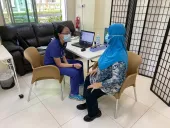
4 major trends to watch in Asian pharmaceuticals
The Asian pharmaceuticals industry is currently evolving under the influence of four innovation trends, according to Richard M. Johnson, President & CEO, Parenteral Drug Association (PDA), a leading non-profit organization advising the pharmaceutical industry.
“On the product side, one is the growing importance of biological therapeutics. These products require more complex and highly controlled manufacturing processes, and more advanced facilities and Quality Control methodologies. The second trend is for more self-administration (for example: pre-filled syringes and autoinjectors) versus administration by health care workers,” says Johnson.
“On the manufacturing side, there is a new emphasis on meeting global standards in good manufacturing practice (GMP), especially since the global supply chain has become so interrelated. There is also a trend to the design and use of smaller batch manufacturing,” he adds.
Biologics
Multinational companies like Novartis are investing heavily in biological therapeutics in response to strong demand from Asian patients for more effective and cost-efficient treatments. “In the past few years, biologics have become increasingly important to Novartis in addressing unmet clinical needs. The special properties of biologics are changing traditional ideas about drug discovery and development and are allowing scientists to create therapeutics that work with remarkable precision,” says Angie Kim, Managing Director, Novartis Singapore. Novartis is investing S$500 million into building a high-tech biologics manufacturing centre in Singapore that is set to be ready by 2016.
Kim said the country is an especially attractive hub for biomedical manufacturing because of its good governance and stability, strong intellectual property laws, worldclass infrastructure, exemplary safety and regulatory record, and highly-skilled biomedical workforce.
Logistics connectivity
Singapore’s location also provides pharmaceutical manufacturers in the country excellent logistics connectivity with target markets, including the fast-growing Southeast Asia market whose populations are increasingly gaining access to medicine and treatments.
Meanwhile, developed Asian markets are seeing higher percentages of elderly that are living longer and requiring more intensive healthcare needs. Pharmaceutical companies in Asia are also under pressure to meet stringent international GMP standards, so many choose to build manufacturing facilities in Singapore where tough government requirements are enforced.
“Since many of the manufacturers in Singapore are manufacturing for export to markets around the world, this international perspective is an advantage as they work to meet the requirements both of Singapore and other Health Authorities,” says Johnson.













 Advertise
Advertise













